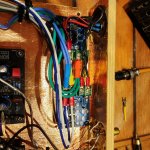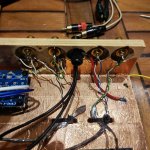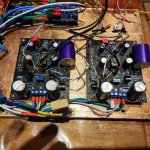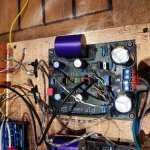Hey team,
Have built three of these and love them - recently had one I built for a friend go down - interestingly a bad Input opamp - I was using the LME49710 in both his and mine, with the OPA27. Anyways, I swapped him out to OPA27 completely and I was able to do some AB testing between the two. Have to say I preferred the Dual OPA27. With the same control track, felt like bass and drums were slightly less sharp on the attack (kind of missed it) but far more prescence in the vocals and even higher guitar noodling. All that to say it got me wondering what other pairs could be tested as well as the improvement available via coupling cap. Ill likely be temped to try the OPA1611 / OPA27 combo next. Anyways was a nice "discovery" and definitely some audible shifts.
Have built three of these and love them - recently had one I built for a friend go down - interestingly a bad Input opamp - I was using the LME49710 in both his and mine, with the OPA27. Anyways, I swapped him out to OPA27 completely and I was able to do some AB testing between the two. Have to say I preferred the Dual OPA27. With the same control track, felt like bass and drums were slightly less sharp on the attack (kind of missed it) but far more prescence in the vocals and even higher guitar noodling. All that to say it got me wondering what other pairs could be tested as well as the improvement available via coupling cap. Ill likely be temped to try the OPA1611 / OPA27 combo next. Anyways was a nice "discovery" and definitely some audible shifts.
hi all guys, and thanks Richard for this creation, i couldn't be happier with the sound of my emerald.
i just bought an used one and it's pretty sounding but i have an issue, there is some background noise like electrical noise that becomes very naggy on the second half of the volume of my amplifier.
i already tried to remove the earth and it's not disappearing, it disappears only when i plug in the second RCA input rca jacks with loads (100 or 300 it's the same, it disappear).
all the tests were done with the turntable disconnected so the noise is coming from the emerald.
my problem is that my turntable have a MM head so i don't need any load on the second RCA and for the same reason jumpers are all open, i'm attaching some photo in order to help understand you.
my idea to solve is to try to put some jacks with a dummy load like the lower i can find, could this work for you?
sorry for my bad english and my bad explanation but it's not my mother tongue and i'm not so skilled in electric



i just bought an used one and it's pretty sounding but i have an issue, there is some background noise like electrical noise that becomes very naggy on the second half of the volume of my amplifier.
i already tried to remove the earth and it's not disappearing, it disappears only when i plug in the second RCA input rca jacks with loads (100 or 300 it's the same, it disappear).
all the tests were done with the turntable disconnected so the noise is coming from the emerald.
my problem is that my turntable have a MM head so i don't need any load on the second RCA and for the same reason jumpers are all open, i'm attaching some photo in order to help understand you.
my idea to solve is to try to put some jacks with a dummy load like the lower i can find, could this work for you?
sorry for my bad english and my bad explanation but it's not my mother tongue and i'm not so skilled in electric
Attachments
@Cliffordlee
That Emerald you obtained looks rather messy, and the less said about the soldering quality the better, but I think it is working properly.
The noise will be high if the inputs are left open circuit. You have to leave the cartridge connected, or use a dummy load <1 kohms for testing.
The noise will also be audible if you turn the system volume all the way up past the normal listening level.
The chassis is wood but lined with metal foil and connected to the circuit common, so that's fine.
Note the previous owner has customized the op amp selection, TL1115 on IC1, some SOIC I can't ID on IC2.
If it sounds fine at normal listening levels, I'd be inclined not to touch it.
/RM
That Emerald you obtained looks rather messy, and the less said about the soldering quality the better, but I think it is working properly.
The noise will be high if the inputs are left open circuit. You have to leave the cartridge connected, or use a dummy load <1 kohms for testing.
The noise will also be audible if you turn the system volume all the way up past the normal listening level.
The chassis is wood but lined with metal foil and connected to the circuit common, so that's fine.
Note the previous owner has customized the op amp selection, TL1115 on IC1, some SOIC I can't ID on IC2.
If it sounds fine at normal listening levels, I'd be inclined not to touch it.
/RM
Hi Richard and thanks for your answer, let me clarify some points
-If I test the emerald without turntable connected it's silent, if I connect it it start nosing even with turntable plugged off from electricity, but If I use 100 ohm resistance it remains silent, given the fact my turntable is MM cartridge have I to use a dummy load 1kohm together the std input to keep it silent?
-rear wood panel is not tin foiled, does this matters ?
-are there some contraindications to keep gain jumper on with mm cartridges ?
Thanks
-If I test the emerald without turntable connected it's silent, if I connect it it start nosing even with turntable plugged off from electricity, but If I use 100 ohm resistance it remains silent, given the fact my turntable is MM cartridge have I to use a dummy load 1kohm together the std input to keep it silent?
-rear wood panel is not tin foiled, does this matters ?
-are there some contraindications to keep gain jumper on with mm cartridges ?
Thanks
Is the noise hum or more like static?
If it is silent with the 100 ohm input load, but noisy (hum?) with the cartridge plugged in but the turntable turned off, that narrows it down a lot.
1. The cable used to connect the cartridge to the Emerald is picking up noise
2. The grounding arrangement in the Emerald generates a ground loop connected to the ground plane of the turntable
One thing to check, with the dummy load in place, connect a cable from the right input ground to the left input ground at the RCA jacks. If that doesn't change the noise, then try lifting the ground of the turntable, if it has one. You also need to connect a ground wire from the Emerald to the Turntable of course.
Sometimes this problem can be sources to an improperly wired tonearm, but that's a rare case.
If it is silent with the 100 ohm input load, but noisy (hum?) with the cartridge plugged in but the turntable turned off, that narrows it down a lot.
1. The cable used to connect the cartridge to the Emerald is picking up noise
2. The grounding arrangement in the Emerald generates a ground loop connected to the ground plane of the turntable
One thing to check, with the dummy load in place, connect a cable from the right input ground to the left input ground at the RCA jacks. If that doesn't change the noise, then try lifting the ground of the turntable, if it has one. You also need to connect a ground wire from the Emerald to the Turntable of course.
Sometimes this problem can be sources to an improperly wired tonearm, but that's a rare case.
The noise is like a rustle, about your points above
1 it's what I supposed but if I connect turntable directly to the amplifier no noise
2 I tried to disconnect all the grounds and noise increase so I guess it's not a ground loop
1 it's what I supposed but if I connect turntable directly to the amplifier no noise
2 I tried to disconnect all the grounds and noise increase so I guess it's not a ground loop
Could be a bad solder joint...or by the looks maybe a good cleaning of the boards. (but that could be the photo ?)
You say 'not so skilled in electric', how good are you with solder ?
Some flux and a re-heat of the worst solder joints could help.
Connecting the turntable directly to the amplifier... do the amplifier have a dedicated phono input ?
(I had to ask....a phono input are about 100x more sensitive than the 'CD' input)
It's the whole comparing apples to oranges thing 😉
On another note, I would move the rectifier/snubber thingies to the transformer box,
they are very close to the signal wires.
You say 'not so skilled in electric', how good are you with solder ?
Some flux and a re-heat of the worst solder joints could help.
Connecting the turntable directly to the amplifier... do the amplifier have a dedicated phono input ?
(I had to ask....a phono input are about 100x more sensitive than the 'CD' input)
It's the whole comparing apples to oranges thing 😉
On another note, I would move the rectifier/snubber thingies to the transformer box,
they are very close to the signal wires.
Hi
I'm an honest solder man, when I say not skilled in electric I mean in terms of knowledge, obviously I can recognize a cap from a diode but I'm not a pro in that terms, my amp have no phono input it's a headphone amp but no noise on it, if I disconnect turntable gnd noise appears so with gnd connected and directly in the amp no noise,
For me too rectifiers are too near to the signal wires, about that these are made with a lan cable, is that fine? Because I noticed if I touch with my finger the ones on the input side it gives an enormous noise
I'm an honest solder man, when I say not skilled in electric I mean in terms of knowledge, obviously I can recognize a cap from a diode but I'm not a pro in that terms, my amp have no phono input it's a headphone amp but no noise on it, if I disconnect turntable gnd noise appears so with gnd connected and directly in the amp no noise,
For me too rectifiers are too near to the signal wires, about that these are made with a lan cable, is that fine? Because I noticed if I touch with my finger the ones on the input side it gives an enormous noise
LAN cable should be fine.
Since you're having noise problem and not hum (ie 50/100Hz) it's probably a bad solder joint or some kind of oscillation.
Do any of the op-amps get warm ?
What OP-amp is the SMD one on the green pcb ? (some fast ones like to oscillate)
Since you're having noise problem and not hum (ie 50/100Hz) it's probably a bad solder joint or some kind of oscillation.
Do any of the op-amps get warm ?
What OP-amp is the SMD one on the green pcb ? (some fast ones like to oscillate)
OK, the 1115 draws about double the idle current than the OP27, it gives off about 0,25Watt - so warm but not scalding hot.
OPA1611, interesting choice - not too extreme, a bit high on the offset voltage - but for MM probably OK.
For MC I would swap to 1115 as IC1.
Then if all solder joints look OK it's back to the cables...

You have at least one big antenna with the grounding.
OPA1611, interesting choice - not too extreme, a bit high on the offset voltage - but for MM probably OK.
For MC I would swap to 1115 as IC1.
Then if all solder joints look OK it's back to the cables...
You have at least one big antenna with the grounding.
Remember though that the noise only happens when the cartridge is connected, not with a dummy load. So it's not noise pickup within the Emerald chassis.
Richard, you are correct, I might have derailed the troubleshooting somewhat, sorry.
Let's start over 🙂
The Emerald is also an amplifier, MM setting amplifies your signal (and noise) 100x to 1000x depending on frequency.
Check the wiring of your turntable, mine was suspicious close to the pickup:

...and I changed to the fancy ones in the picture...
EDIT: Your cartridge might need some capacitance loading, try 100pF over the inputs.
Let's start over 🙂
1 kohm is too low for most MM cartridges, what brand / model of cartridge do you have ?....my turntable is MM cartridge have I to use a dummy load 1kohm together the std input to keep it silent?
The high gain jumper will most likely increase your noise problems-are there some contraindications to keep gain jumper on with mm cartridges ?
Connecting directly to the amplifier results in about 100x less signal and noise.1 it's what I supposed but if I connect turntable directly to the amplifier no noise
The Emerald is also an amplifier, MM setting amplifies your signal (and noise) 100x to 1000x depending on frequency.
Best to leave the boards as they are, for now.So if I turn the board 180 deg. And reduce wires length could improve this?
Check the wiring of your turntable, mine was suspicious close to the pickup:
...and I changed to the fancy ones in the picture...
EDIT: Your cartridge might need some capacitance loading, try 100pF over the inputs.
Last edited:
@kenta16807
A "dummy load" isn't the input load for the cartridge (47kohms for MM typical); it's a resistor connected to the input in place of the cartridge temporarily that mimics the internal resistance of the cartridge that would be present in the circuit if the cartridge was connected. For MM this might be a few hundred ohms, max, while for MC you can just short the input instead.
A "dummy load" isn't the input load for the cartridge (47kohms for MM typical); it's a resistor connected to the input in place of the cartridge temporarily that mimics the internal resistance of the cartridge that would be present in the circuit if the cartridge was connected. For MM this might be a few hundred ohms, max, while for MC you can just short the input instead.
Yes, but I read that as a question if 1k extra load would improve things...
I'll try to restrict my incoherent postings, sorry for adding to the confusion 🙂
I'll try to restrict my incoherent postings, sorry for adding to the confusion 🙂
hi all, so to answer your questions
i have a Stanton 680 EE
yep but without gain i have to push my amplifier around 3 o clock so there is the same noise, with gain i can stay around 11-12 and noise it's more or less the same with higher volume music
yes but if i disconnect the ground of the turntable there is an incredible noise that comes to 0 if i connect it even at max volume
got it, i recorded some videos to let you understand the noise:
this is with dummy load 1k:
this is with turntable connected, it's not powered:
thanks
1 kohm is too low for most MM cartridges, what brand / model of cartridge do you have ?
i have a Stanton 680 EE
The high gain jumper will most likely increase your noise problems
yep but without gain i have to push my amplifier around 3 o clock so there is the same noise, with gain i can stay around 11-12 and noise it's more or less the same with higher volume music
Connecting directly to the amplifier results in about 100x less signal and noise.
yes but if i disconnect the ground of the turntable there is an incredible noise that comes to 0 if i connect it even at max volume
A "dummy load" isn't the input load for the cartridge (47kohms for MM typical); it's a resistor connected to the input in place of the cartridge temporarily that mimics the internal resistance of the cartridge that would be present in the circuit if the cartridge was connected. For MM this might be a few hundred ohms, max, while for MC you can just short the input instead.
got it, i recorded some videos to let you understand the noise:
this is with dummy load 1k:
this is with turntable connected, it's not powered:
thanks
Ahh, that's a somewhat rare beast 🙂i have a Stanton 680 EE
Recommended Capacitive load are 275 pF.
Sorry I'm not so skilled in this field, so my head is not matching well with emerald?
It should have in addition the switch board of Richard to better match ?
It should have in addition the switch board of Richard to better match ?
The Switchboard would conveniently allow you to load the cartridge correctly, but it won't fix the noise you are hearing.
Which, to me, sounds like an op amp with the input left floating, of perhaps with the feedback resistor disconnected -- a circuit running with way more input sensitivity than intended, in other words, so every little electrical noise is magnified. Though I suppose if you were recording those videos with the gain at max that could also account for it.
Which, to me, sounds like an op amp with the input left floating, of perhaps with the feedback resistor disconnected -- a circuit running with way more input sensitivity than intended, in other words, so every little electrical noise is magnified. Though I suppose if you were recording those videos with the gain at max that could also account for it.
- Home
- Source & Line
- Analogue Source
- RJM Audio Emerald Phono Stage Help Desk



